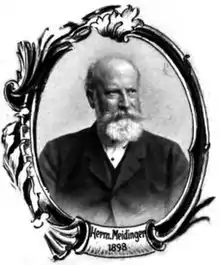 | |
| Parent company | Globus Verlag |
|---|---|
| Founded | 1869 |
| Founder | Hermann J. Meidinger |
| Country of origin | Germany |
| Publication types | Books |
Meidingers Jugendschriften Verlag was a German children's publisher best known for the Nesthäkchen books of Else Ury.
Early years
.jpg.webp)
Meidingers Jugendschriften Verlag’s history began on January 1, 1869, when Hermann Joseph Meidinger (b 20 Jun 1842, Rödelheim, d 15 May 1898, Berlin) founded in Berlin the publishing company Herm. J. Meidinger. After his death in 1898, his widow Therese Meidinger took over the business. As of May 1, 1907, the children’s book department was spun off from the company. This was the birth of Meidingers Jugendschriften Verlag GmbH. On May 18, 1907, Meidingers Jugendschriften Verlag GmbH was taken over by the Wertheim Department Store and combined with Globus Verlag GmbH, founded 1898, which was the publishing house of Wertheim. Globus published the works of Jules Verne: Twenty Thousand Leagues Under the Sea and Around the World in Eighty Days.[1][2]
Later years

Meidingers Jugendschriften Verlag’s main office was at Globus Verlag, but it was known as Meidingers Jugendschriften Verlag GmbH. Until 1908 the headquarters was at Voßstraße 33 in Berlin W 9, then in the Kaiserhofstraße 1, Berlin W 66. From 1919 all publishers belonging to Wertheim moved to a new business address at Wilhelmstraße 45, Berlin W 66 (later W 8 at Postbezirk 1). At the same time Globus founded their own book printing company, the Globushaus Druckerei, Berlin W 66.[3][4]
Else Ury
Meidingers Jugendschriften Verlag gained fame among readers in the 1920s and 1930s through the 1.25 million book series Nesthäkchen by Else Ury. Ury’s books were immensely popular among the pre-World War II generation of youth. On her fiftieth birthday, 1 November 1927, Meidingers Jugendschriften Verlag honored Ury with a large reception at the Hotel Adlon. Ury was Jewish and not allowed to publish after the beginning of the Nazi period. She was murdered at Auschwitz in 1943.[5][6][7]
Aryanization
After the National Socialist seizure of power in 1933 and the associated Aryanization of Wertheim, the changes in Meidingers Jugendschriften Verlag are difficult to follow. Around 1937, the company moved to Bellevuestraße 5 in Berlin W 9. In 1939 the Managing Director Emil Kersten liquidated Meidingers. In 1941 all Meidingers’ books went out of print and existing stocks went to the Globus Verlag GmbH.
References
- ↑ Reinhard Würffel: Lexikon deutscher Verlage von A - Z : 1071 Verlage und 2800 Verlagssignete vom Anfang der Buchdruckerkunst bis 1945;Berlin : Verlag Grotesk, 2000. ISBN 3-9803147-1-5; Seiten 554 ff.
- ↑ Börsenblatt für den Deutschen Buchhandel; Leipzig Nr. 204, 3.9.1895, S. 4605 – zitiert aus: Wolfgang Thadewald Abenteuerliche Reisen durch die Presse zu Julius Verne S. 143
- ↑ Börsenblatt für den Deutschen Buchhandel 58(1891) Nr. 246 vom 22. Oktober, S. 6242
- ↑ Börsenblatt für den Deutschen Buchhandel 73(1906) Nr. 263 vom 12. November, S. 11470
- ↑ Lüke, Martina. "Else Ury – A Representative of the German-Jewish Bürgertum. Not an Essence but a Positioning": German-Jewish Women Writers 1900-38. Eds. Godela Weiss-Sussex and Andrea Hammel. Martin Meidenbauer Verlag: München, 2009 and Institute of Germanic & Romance Studies; School of Advanced Study, University of London, 2009 (Publication of the Institute of Germanic Studies, 93). 77-93.
- ↑ Melissa Eddy. Overlooked No More: Else Ury’s Stories Survived World War II. She Did Not. NY Times July 10, 2019
- ↑ PJ Grisar. Remembering Else Ury, Famed Children's Writer and Victim of the Holocaust. Forward July 17, 2019